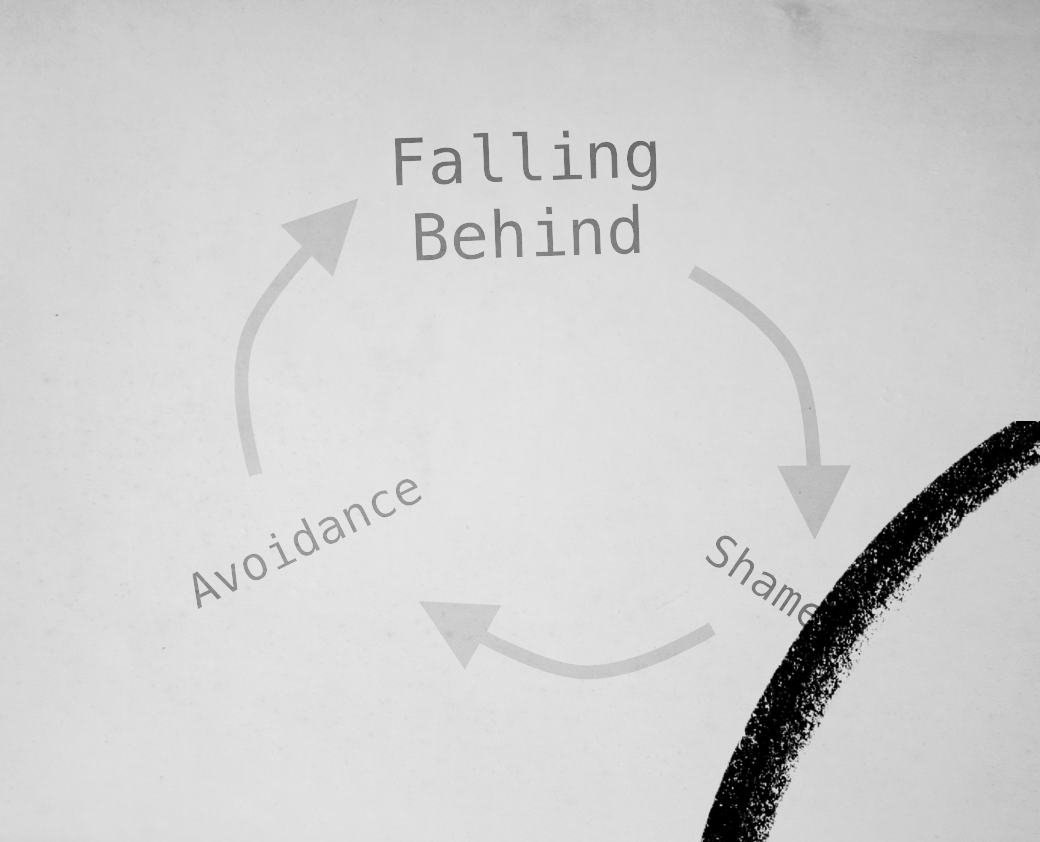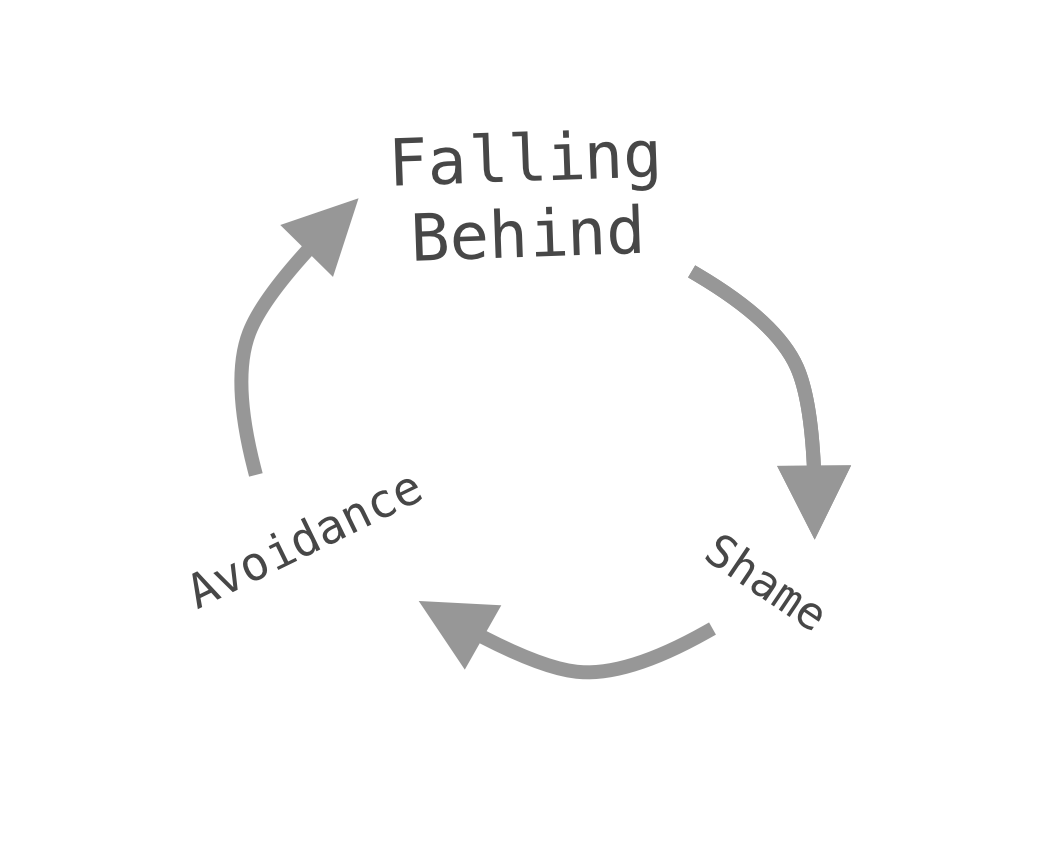
Let me know if you’ve ever felt this way:
Everything is piling up. Emails, todos, housework, bills, taxes, books to read. It’s endless.
You develop avoidance. You can’t even look at the things you need to do.
What’s worse is the knowledge that two months ago you had the perfect system. Everything was humming on all cylinders.
But now the mess is up to your ears. It’s everywhere you turn.
You start piecemeal triage. Instead of clearing everything out, you just put out the really urgent fires. You’re not doing everything you need to do, but you are doing just enough to quell the, “Just following up on this…” emails you feel guilty about even getting.
Guilt. That’s a good word. Shame is another one. Compounded by the persistent thought, Is this ever going to go away? Am I just like this now?
It’s a constant weight. You feel bad. It feels like it’s going to go on forever.
This is how I am, you think.
Then, suddenly, from one moment to the next: your wind picks up. The leaves start to rustle. Thunder. Lightning. ZAP.
Everything shifts.
You’re suddenly like the mother who lifts an entire car to rescue her trapped child. You’re full of piss and vinegar.
You sit down at your laptop. You crack your knuckles. Energy is crackling in your fingertips.
You are a warrior. You will not be beaten. You will conquer this mess right now.
And in a furious fugue state you beat back the emails. You plow through the todos. You clean your apartment from top to bottom.
You restore balance to the universe. Everything is okay again.
You look at your watch. It took you about an hour. Maybe two.
You’ve just experienced a productivity cycle.
Where productivity cycles come from
For me, the trigger is non-equilibrium.
There are two big causes of non-equilibrium in my life: busy-ness, and big emotional events.
Busy-ness
This one is pretty simple: some days I’m just too busy to get through all of my emails. Or I get home too late and too exhausted to do the dishes.
The next day, the same thing happens. So now I’m two days behind on emails. But I’ve compounded that with the shame of already being behind.
So I’m busy, exhausted, and full of shame. By the third day this creates avoidance. I don’t want to even look at the mess I’ve made.
Now it’s a self-perpetuating cycle — the mess gets bigger the longer I don’t deal with it, but my feelings of avoidance are also getting stronger for the same reason.
Strong emotional events
But there’s another subtle source of non-equilibrium for me: strong emotional events. It’s hard to get things done when I’m not centered.
Sometimes that can be as simple as getting an email from someone important that I don’t immediately know how to answer.
Maybe the email requires me to do a bunch of research to respond to. Or maybe it causes me to reevaluate how I’ve been thinking about something important in my life.
I skip over answering it. But it’s on my mind. And because I haven’t answered it, I avoid even going into my email. Now I’m behind on everything else.
And the same cycle happens: days go by, things pile up, shame piles up, avoidance increases.
Putting things off for later
When I pay attention closely to my experience, the reason I fall behind is that I’m deluding myself into avoiding the tasks I need to do until I “have the time” to sit down and knock them all out.
I’ll push off the email until later today when I have a couple of hours free to really think about it.
But, especially in busy or emotional periods, that time never really comes. And every time my mind wanders to the thing I have to do but haven’t done, my avoidance gets worse.
It’s like my mind has this Avoidance Counter, and every time I think about a task and then don’t do it, I add one to my Avoidance Counter. It works like this;
Think about a task you’re avoiding -> Don’t do the task -> Task feels even bigger and more unappealing -> Avoidance increases
A change of scenery
So how do we solve this?
The thing that seems to work for me is a change of scenery.
Sometimes it’s a change in system: I switch from digital to paper. I switch from Airtable to Notion.
The change in system leaves all the crap behind, and lets me automatically focus on what’s important.
Sometimes it’s a change in surroundings: I don’t go into the office, and instead work out of a coffee shop. I start to work from home.
Sometimes it’s even a change in how I dress, how I eat, or who I hang out with.
For whatever reason, making a drastic change often gets me out of my rut and back on track again. It helps me clear out the detritus, dust off the cobwebs, and leave my tired unproductive self behind.
Leaning in
I used to think that needing to start fresh was bad.
No one wants to declare bankruptcy. No one wants to go into witness protection. No who cares about their todo list wants to throw everything out.
I have this ideal of myself as a machine.
Constant, irrepressible.
I want my butt in a seat every day at 8 am. I want to grind out work for 12 hours and then go home having left it all on the field.
And I can live this way — for a while. But it always comes unraveled.
I used to hate this. It felt like I was weak, or unproductive, or somehow bad.
But now I think it’s normal. Why would we not need rest? Why would we not need variety?
Athletes have off-seasons. Athletes change their workout routines when they hit a plateau.
Why shouldn’t you?
If you lean in to productivity cycles the following things happen:
You rid yourself of the guilt, shame, and angst associated with them, and instead accept that you’re going through an inevitable period of low productivity
That allows you to take active steps to resolve the cycle: changing your tools and your routine to kickstart you into a new one.
A personal example
A few weeks ago my Todoist started to get filled up:
There was this ever-growing list of overdue tasks that I was constantly pushing off. I started to feel avoidant. I started to worry that I was never going to get anything done. I started to feel like it was a completely insurmountable task to get back on track.
But instead of filling myself with angst, and guilt, and shame I just decided to make a conscious change.
I closed Todoist, and walked to Goods for the Study. I bought a beautiful new paper notebook.
It’s creamy white, and its pages are thick and square and far smoother than the pocket Moleskine’s I usually use. It’s tactile. It feels like it’s made with care. It’s from Japan. It’s got a place in the front for your passport.
I opened it, and the first thing I avoided doing was transferring all my old tasks into it. The best part of this notebook is that it’s blank. And that it feels totally different from my Todoist setup.
It’s blank and untainted.
After leaving the store, I wrote down the 3 big things I had to do that day on the first page of my new notebook. I did this from memory. I allowed myself to completely forget about the 98 overdue tasks inside my Todoist.
By the end of the day I had gotten done those 3 things. It felt good.
I went home, watched an episode of The Crown and went to sleep.
The next day, I got up in the morning and put on a nice watch. My grandfather’s. I usually only wear it for special occasions.
I changed up my uniform too. I dressed up in a freshly pressed button-down shirt — different from the jeans and a t-shirt I normally wear to work.
I tried to summon as much enclothed cognition juice as I could.
Instead of going into my office, I went to a new coffee shop near my apartment. I wrote down my top 3 priorities for the day. And I got to work.
It’s been a couple of weeks and those 98 todos are still in my Todoist. Eventually I’ll clean them out. But they really don’t matter that much right now.
I just needed to start fresh.
The perfect system is the next system
Most people on this list are looking for the perfect system.
But what if the point is that no system is perfect, but every system works for a while.
And what if we planned to switch our systems when they no longer work for us? What if the perfect system is actually perfect because it is next.
What if every time we hit a rut in Todoist, we just started fresh with a paper notebook. Or switched to Notion? Or built ourselves an Airtable?
How would that feel?
That’s what I’ve been doing — and it actually feels great to lean in. It takes all of the angst and guilt out of it, and gives you the fresh start you need but can’t admit.
Building our tools for productivity cycles
Here’s an interesting thought experiment: What if our tools recognized these cycles and helped us out of them?
Should Todoist notice that you have 100 items in your “Overdue” box and just automatically archive them?
Should Superhuman notice your response time has slowed significantly over the last 3 days and automatically respond to new emails to say your inbox is backed up?
Or should they do even more drastic things?
Should Todoist notice you’re in a productivity slump and completely change its interface to something new and fresh and exciting?
Imagine getting that new system feeling every 2 months, automatically from your tools.
What would that be like? If you want something like this, let me know. If enough members want it, I’ll build it for us :)
Please comment below! Do you experience productivity cycles? What do you do to get out of them? I’d love to hear from you!
The Only Subscription
You Need to
Stay at the
Edge of AI
The essential toolkit for those shaping the future
"This might be the best value you
can get from an AI subscription."
- Jay S.
Join 100,000+ leaders, builders, and innovators

Email address
Already have an account? Sign in
What is included in a subscription?
Daily insights from AI pioneers + early access to powerful AI tools












Comments
Don't have an account? Sign up!
As someone who went from Anydo to Wunderlist to Todoist to Notion to ClickUp, this resonates so much. But getting a new system is a headache in and of itself, as I am quite worried that I will miss something important. It is almost impossible for me to start over with a blank page. It may be doable, but what if you have a huge software development project, then what do you do? Guess we'll learn to deal with these cycles somehow.
@ymansurozer makes sense, so glad you found it useful! definitely tougher with a big project that you need to transfer